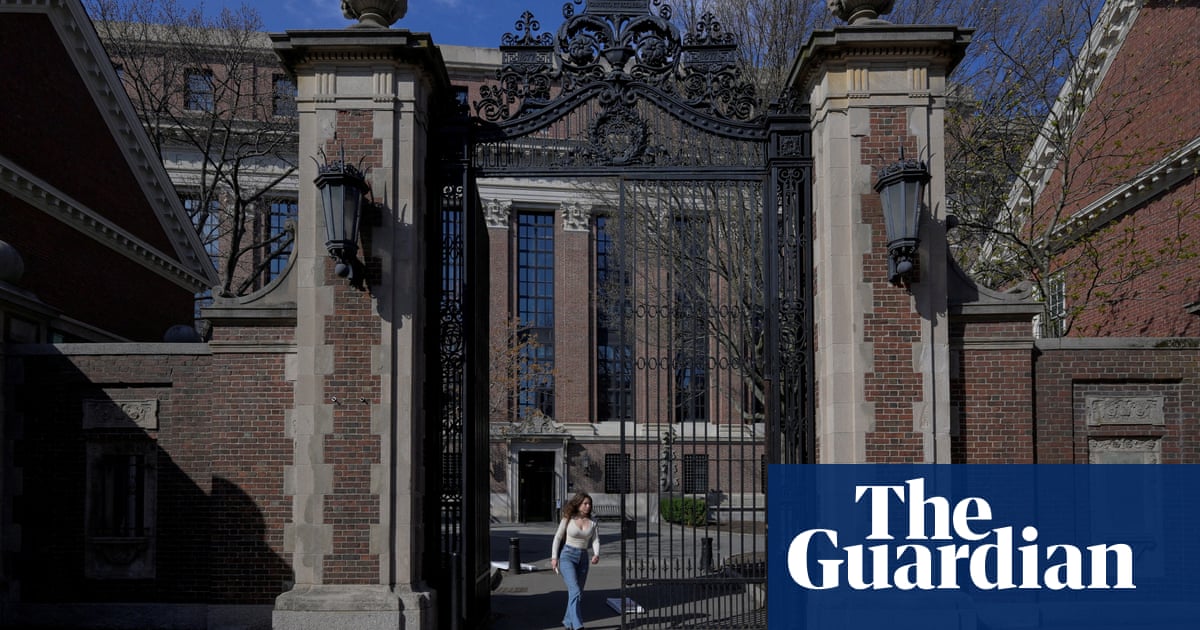TheTrump administrationsaid it would investigate whetherHarvard Universityand the student-run journal, the Harvard Law Review, violated civil rights law when editors of the prestigious journal fast-tracked consideration of an article written by someone of a racial minority.
News of the investigation on Monday night came hours after a federal judge agreed to expedite Harvard University’slawsuitchallenging the administration’sfreeze of $2.3bn in federal funding. The Ivy League elite private university, the oldest and wealthiest in the US, has warned the freeze would threaten vital medical and scientific research.
“Harvard Law Review’s article selection process appears to pick winners and losers on the basis of race, employing a spoils system in which the race of the legal scholar is as, if not more, important than the merit of the submission,” said Craig Trainor, the US education department’s acting assistant secretary for civil rights, in a statement. The investigation wasannounced jointlyby the Departments of Education and Health and Human Services.
The administration argued the school and law review journal may have violated Title VI of the Civil Rights Act of 1964 by allegedly engaging in “race-based discrimination”.
AHarvard Universityrepresentative said the school is “committed to ensuring that the programs and activities it oversees are in compliance with all applicable laws and to investigating any credibly alleged violations”.
Representatives of the Harvard Law Review, which is a legally independent student-run organization, did not immediately respond to emails seeking comment.
Since taking office, Donald Trump hascracked downon diversity, equity and inclusion (DEI) programs – initiatives that aim to uplift marginalized groups that face and have faced a long history of discrimination. The US president has portrayed steps aimed at helping racial and sexual minorities and women as discriminatory against white people and men.
Harvard University hasbroadlyresistedthe administration’s demands, including calls from the administration to restructure the private university’s governance, alter its hiring and admissions practices to ensure an ideological balance of viewpoints, and terminate certain academic programs.
Harvard Universitysued the administrationlast week after refusing to cede to what the university’s president said were illegal demands from an administration antisemitism task force “to control whom we hire and what we teach”.
The first hearing in that case was on Monday before US district judge Allison Burroughs in Boston. The judge set a 21 July hearing for the case after Harvard warned that threatened cuts were putting research at risk.
Rather than seek a preliminary injunction blocking the freeze pending the outcome of the litigation, Harvard has opted to skip straight to the merits of the case, which both it and the US Department of Justice asked the judge to quickly address.
Harvard andother universitieshave seen federal funding threatened by the administration over how they handled pro-Palestinian protests against Israel’s war inGazathat roiled campuses last year, as well as issues such as DEI, climate initiatives and transgender policies.
TheTrump administrationin late March announced it was launching a review of about $9bn in grants and contracts with Harvard over what it says is the school’s failure to root out antisemitism.
Since then, the Trump administration has frozen $2.3bn in funding to Harvard, threatened to strip its tax-exempt status and take away its ability to enroll foreign students, and other measures. Rights groups have raised free speech and academic freedom concerns over the steps by the government.
Harvard has said that while it is committed to combating antisemitism, Ttrump’s sweeping demands violate the free speech guarantees of the US constitution’s first amendment.
Harvard announced on Monday that it would rename its office for “equity, diversity, inclusion and belonging” to “community and campus life”. Trump has passed executive orders aiming to dismantle DEI in the government and private sector. Harvard’s announcement in an internal email did not lay out what would happen as a result of the renaming.
Reuters contributed reporting
